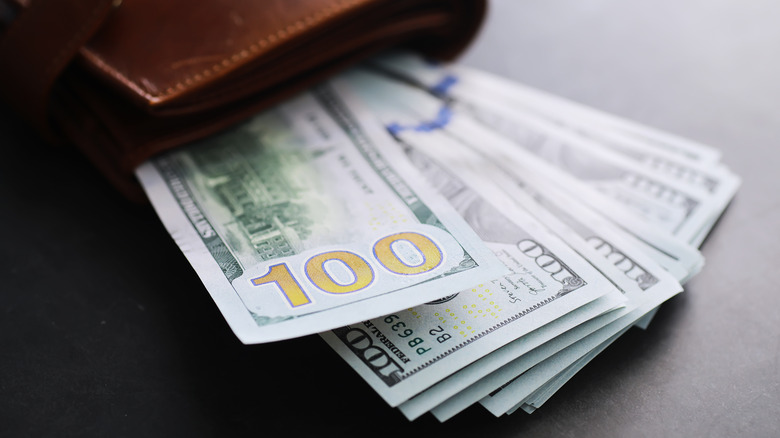5 Tips For Paying Off Your Mortgage Early
There are many reasons to pay off your mortgage early. If you aspire to enter retirement debt-free, paying off your mortgage could free up a significant amount of your fixed monthly income. Since people are living longer after they retire, it's essential to make your money stretch. Being mortgage-free means not only avoiding that monthly payment but also saving on interest. According to Schwab, paying off your mortgage early is particularly beneficial if you have a high interest rate.
Even if you are not yet thinking about retirement, there are benefits to paying off your mortgage early. Owning your home outright means there is no fear of foreclosure, giving you peace of mind. It also offers a significant amount of equity if you ever need to borrow against your home's value. Regardless of your reason for paying off your mortgage early, there are several simple ways to accomplish this task.
Biweekly payments
Some mortgage companies will allow you to switch from monthly payments to biweekly payments. It seems like making a half payment twice a month rather than a full payment once a month would not make much difference, but according to Ramsey, this process can reduce your 30-year mortgage by up to four years and save you a significant amount of money in interest.
Even though it will not noticeably affect your monthly budget, making biweekly payments results in 13 full payments being made each year instead of 12. Since there are 52 weeks a year, switching to biweekly payments means you make 26 half payments, resulting in a total of 13 monthly payments. Every mortgage company is different, so check with yours to see if it's possible to set up a new payment schedule. If your mortgage holder requires a fee for each payment you make or charges you to set up a new payment schedule, this may not be the right option for you. But if your lender does not charge added fees, this is a simple way to pay off your mortgage early without sacrificing anything.
Regular extra payments
If you know you have extra money coming in at certain times each year, this is a great way to apply extra payments to your mortgage. For example, if you get a yearly bonus from work, make a plan to set some or all of it aside to use as an extra mortgage payment, suggests Nationwide.
You can apply this plan to any situation in which you consistently get extra money. If you regularly get a tax refund, use it for an additional mortgage payment. The most important thing to remember when you are making extra payments is to ensure your lender applies the entire amount to the principal of your loan instead of processing it as a regular mortgage payment. If you do not make this designation, your mortgage company will treat it like an early regular payment used toward the principal and interest, which will not save you any money. Applying those extra payments directly to the principal will allow you to pay off your mortgage early and save on interest.
Lump sum payments
Making additional lump sum payments to the principal of your mortgage is as simple as it sounds — you simply make a payment any time you have some extra money. This type of random payment can be as small as a few hundred dollars a year, according to Credible.
There is no schedule or specific plan to make extra lump sum payments, and they do not have to be a full payment. You can pay $50 one month when you sell something online or a few thousand dollars another month if you get a surprise inheritance. Regardless of when and how much you apply to your mortgage, it will add up and shorten the amount of time you pay on your loan. For example, paying an extra $50 toward your 30-year mortgage four times a year adds up to $6,000 plus the amount you save on interest. Like all extra payments, when you make random lump sum payments, make sure they are applied directly to the principal of your loan.
Refinance
If you are paying a loan with a higher-than-average interest rate, you may benefit long-term by refinancing to pay less in interest over the life of your loan. You can also opt to change your loan terms from a 30-year loan to a 10 or 15-year loan, which may increase your monthly payments. If you can afford the higher payments, CNN states you will build equity in your home much more quickly while paying it off in half the time. And, of course, that's more than a decade's worth of money saved in interest you can put toward retirement or whatever else your heart desires.
There are different types of refinancing options, according to Rocket Mortgage. Some people refinance to make home improvements or pay off debt but to save money and pay off your mortgage early, choose a shorter mortgage term. If you switch from a high-interest mortgage to a low-interest, shorter-term mortgage, you might be surprised at how little your monthly mortgage payment increases. LendingTree states refinancing your mortgage can cost between 2% to 6% of the amount you are borrowing, so to get the best rate, shop around. Refinance costs and interest rates vary depending on the lender.
Mortgage recasting
A lesser-known option for paying off your mortgage early is mortgage recasting. Although it works a lot like refinancing, it is a much simpler and less costly process. When you choose this option to update your mortgage, you retain your current loan and mortgage provider as well as your interest rate and the term of your loan, according to Bankrate. The benefit of mortgage recasting is to lower your monthly payment, freeing up more money in your budget to pay down debt.
Like refinancing, there is a fee for mortgage recasting, but it is significantly less at around $300. To qualify for mortgage recasting, you will need to apply a lump sum payment toward the principal of your loan. Then your mortgage company will create a new amortization schedule, which is your new monthly payment. This is a good option if you want to free up money to use toward any of the other early mortgage payment options.





